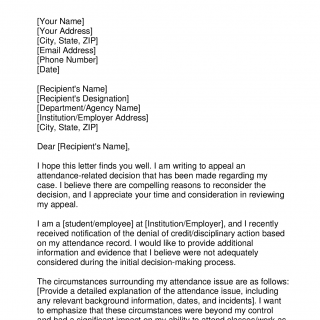Attendance Appeal Letter
Request for Reconsideration of Attendance-related Decision
Parties: Student/Employee (Appellant) and Academic Institution/Employer (Recipient)
Main Purpose: To contest an attendance-related decision, present supporting evidence, and request a review for a potential change or modification to the outcome.
Parts of the Letter:
- Heading: Contains the appellant's contact information, including name, address, email, and phone number.
- Date: Indicates the date when the letter is written.
- Recipient's Information: Includes the name, designation, department/agency, and address of the recipient.
- Salutation: Begins with a respectful greeting addressing the recipient.
- Introduction: Briefly explains the purpose of the letter and states the decision being appealed.
- Circumstances: Provides a detailed description of the attendance issue and the relevant circumstances surrounding it.
- Supporting Evidence: Includes any necessary documents, such as medical records, certificates, or other forms of proof, to substantiate the appellant's claims.
- Persuasive Argument: Presents a strong and compelling case for reconsideration, including any mitigating factors or extenuating circumstances.
- Conclusion: Summarizes the key points, expresses gratitude for the recipient's attention, and requests a review of the decision.
- Closing: Ends with a polite and professional closing phrase, followed by the appellant's name and signature.
Required Data:
- Appellant's full name, address, email, and phone number
- Institution/employer's name, address, and department
- Date of writing the letter
- Detailed explanation of the attendance issue and circumstances
- Supporting evidence (e.g., medical records, death certificates, letters of recommendation)
- Any relevant policies or regulations pertaining to attendance
- Dates, times, and specific incidents related to the attendance issue
Additional Attachments: relevant supporting documents, such as medical certificates, death certificates, or any other relevant proofs
Sample of Attendance Appeal Letter
[Your Name][Your Address][City, State, ZIP][Email Address][Phone Number][Date][Recipient's Name][Recipient's Designation][Department/Agency Name][Institution/Employer Address][City, State, ZIP]Dear [Recipient's Name],I hope this letter finds you well. I am writing to appeal an attendance-related decision that has been made regarding my case. I believe there are compelling reasons to reconsider the decision, and I appreciate your time and consideration in reviewing my appeal.I am a [student/employee] at [Institution/Employer], and I recently received notification of the denial of credit/disciplinary action based on my attendance record. I would like to provide additional information and evidence that I believe were not adequately considered during the initial decision-making process.The circumstances surrounding my attendance issue are as follows: [Provide a detailed explanation of the attendance issue, including any relevant background information, dates, and incidents]. I want to emphasize that these circumstances were beyond my control and had a significant impact on my ability to attend classes/work as required.To support my appeal, I have attached the necessary documents, including [List the supporting evidence and documents attached, such as medical records, death certificates, or any other relevant proofs]. These documents provide concrete evidence of the extenuating circumstances I faced and how they directly affected my attendance.I humbly request that you reconsider the decision based on the new information presented. Despite the challenges I encountered, I have actively sought ways to catch up on missed work and ensure my future attendance will not be affected. I am committed to my academic/work responsibilities and assure you that this issue will not reoccur.In conclusion, I kindly ask for a thorough review of my appeal. I have full faith in the fairness and integrity of the appeals process. Thank you for taking the time to consider my request, and I look forward to a favorable reconsideration of the attendance-related decision.Sincerely,[Your Name][Your Signature]Attachments: [List the attachments included, such as supporting documents, certificates, or proofs.]
Strengths:
- Provides a structured format for presenting an appeal
- Highlights the appellant's side with persuasive arguments and supporting evidence
Weaknesses: may require careful wording and organization to ensure clarity and effectiveness
Opportunities: offers a chance for the appellant to present a well-documented case and potentially overturn an unfavorable decision
Threats: inadequate presentation of facts or lack of compelling evidence may weaken the appeal
Use Cases and Examples:
- A student appealing against a denial of credit due to excessive absences
- An employee contesting a disciplinary action based on inaccurate attendance records
- Requesting reconsideration of attendance penalties due to extenuating circumstances, such as illness or family emergencies
Related and Alternative Forms:
- Grievance letter: Used to address general complaints or concerns related to work or academics, including attendance issues.
- Academic or employment appeals form: Some institutions provide specific forms to streamline the appeals process, which may require similar information as included in the attendance appeal letter.
A formal letter provides more flexibility to present detailed circumstances and persuasive arguments compared to a form with predefined fields. A letter allows for a more personalized approach, demonstrating the appellant's writing skills and commitment to the appeal.
The letter can be submitted in person, via email, or through any designated submission channel specified by the institution/employer. A copy of the letter should be retained by the appellant for their records, preferably with proof of submission (e.g., email confirmation or received stamped hard copy).
A well-crafted appeal letter can potentially lead to a favorable outcome, such as reversing a disciplinary action or receiving academic credit, which can positively impact the appellant's academic or professional future.

